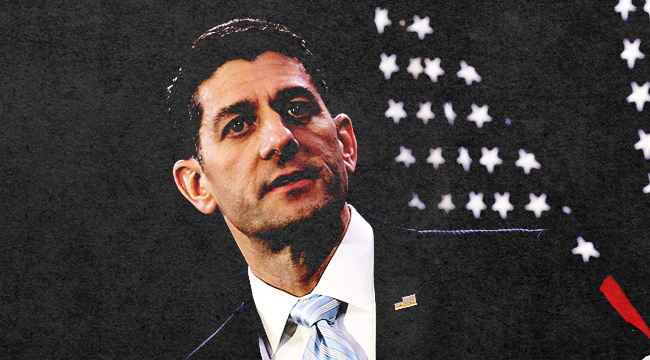
The powerful trade group that lobbies on behalf of the health insurance industry, America’s Health Insurance Plans, has much to celebrate as it holds its national health policy conference at the Ritz-Carlton in Washington this week.
Among other changes long sought by the industry, the draft Republican proposal for a health care overhaul released on Monday would allow insurers to charge older American more for their premiums and rewrite tax law to make it easier for insurance firms to pay executives even higher pay.
Not surprisingly, one of the AHIP conference’s keynote speakers on Thursday will be Congressman Kevin Brady, the Texas Republican who chairs the House Ways and Means Committee, which starts marking up the bill on Wednesday morning.
The trade group represents the largest health insurance companies in America, including Cigna, Humana, Kaiser, Blue Shield of California, and Anthem.
The new Republican legislation, called the American Health Care Act, includes sweeping changes sought by health insurance companies.
The proposal, for instance, shifts the age ratio for premiums, allowing insurance companies to charge older Americans up to five times as much as young people. The AARP, in a letter to legislators, notes that the new 5:1 ratio could cost the average 64-year-old on a silver plan an additional $2,100 per year. Under the Affordable Care Act, the premium cap was 3:1.
AHIP specifically recommended a move to the 5:1 ratio.
The GOP legislation would replace Obamacare’s individual mandate — the requirement that all Americans purchase health insurance — with an idea that similarly penalizes people who go without health coverage. But under the Republican legislation, the penalty will be paid to insurance companies instead of the federal government. Insurers, under the bill, are granted the ability to require a premium surcharge of 30 percent for any individual who loses coverage for a period of at least two months.
The proposal also includes a direct handout to the chief executives of health insurance companies. The Affordable Care Act contained a provision that limited health insurance firms to deducting only $500,000 in taxes of the pay of executives and other employees. The provision was designed to rein in out-of-control health insurance executive compensation, and to encourage insurance firms to pay for health care instead of bonuses for company leadership.
Before the Affordable Care Act, insurance company executives had little incentive not to steer company revenue to executive leadership. UnitedHealth Group chief executive Stephen Hemsley received $109 million in pay in 2009 alone.
The Republican health legislation repeals the Affordable Care Act’s cap. “The Republican plan calls for allowing insurers to write off as a business expense the entire amount of their executives’ salaries on their taxes, and not just the first $500,000, as is the case now under the Affordable Care Act,” CNBC reported. Taking away the limit on corporate pay tax deductions will not only encourage higher executive pay, but will mean companies will pay way less in taxes. The Institute for Policy Studies estimated that the cap generated $72 million in additional revenue in 2014.
AHIP has written to Congress to complain about the cap on deducting executive compensation. The Ways and Means Committee draft of the Republican health overhaul provides for the elimination of the cap on the first page of the bill.
Finally, the legislation creates a backhanded financial giveaway to health insurance companies by nearly doubling the amount individuals and families may save in a tax-free health savings accounts — an idea originally designed by insurance companies as a source of additional income. The accounts are used to pay for out-of-pocket expenses, such as deductibles. But as Los Angeles Times columnist Michael Hiltzik has explained, HSAs primarily benefit wealthy individuals, by shielding their income from taxation, while the accounts themselves are often managed by insurance companies, allowing them to collect revenue by charging fees.
The health insurance lobby has long played a pivotal role in American health care. In 1993, AHIP’s predecessor, the Health Insurance Association of America, helped sink President Bill Clinton’s health reform proposal through a national advertising campaign called “Harry and Louise.”
In 2009, then-AHIP president Karen Ignagni promised President Barack Obama that her group would not repeat its behavior from the early ’90s, telling an audience at the White House that her industry would work towards a positive solution. “You have our commitment to play, to contribute and to help pass health care reform this year,” Ignagni declared.
But the pledge was quietly broken. While Democrats debated the Affordable Care Act, AHIP secretly funneled at least $86.2 million to a third-party business group to air relentless negative campaign commercials and lobby against the plan. Inadvertent filings later revealed that insurance company Aetna also provided at least $7 million in covert funds to groups airing anti-health reform ads.
AHIP, meanwhile, has consistently enjoyed friendly relations with Capitol Hill.
New York Rep. Joe Crowley, the former chairman of the conservative New Democrat Coalition and current chairman of the House Democratic caucus, is slated to speak before AHIP on Wednesday. AHIP’s political action committee sponsored a $1,000 per person fundraiser for House Majority Whip Steve Scalise, who is currently working to win over GOP support for the draft bill, shortly after the inauguration. AHIP’s largest disclosed donation in 2017 has gone to Rep. Kevin Brady, the chairman helping to lead the Republican health repeal effort this week.
The post GOP Lawmaker Shaping Obamacare Repeal to Address Delighted Insurance Lobbyists appeared first on The Intercept.

